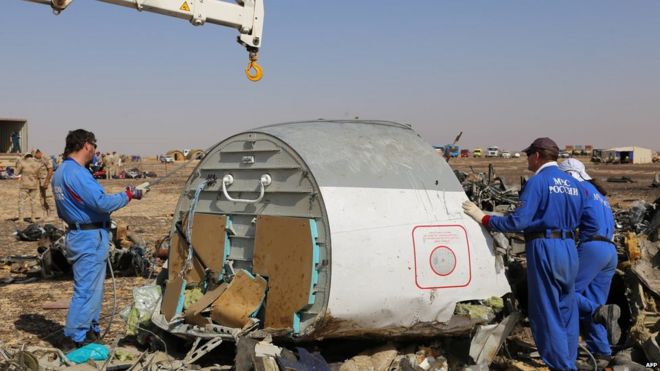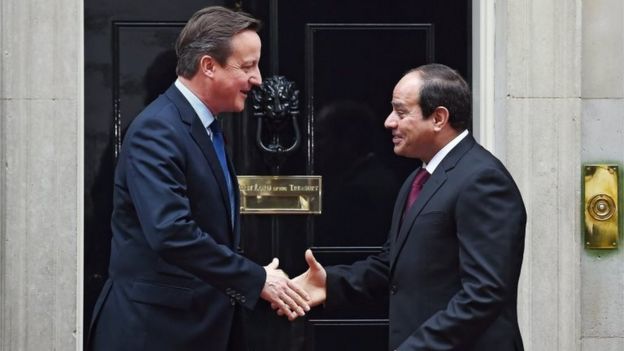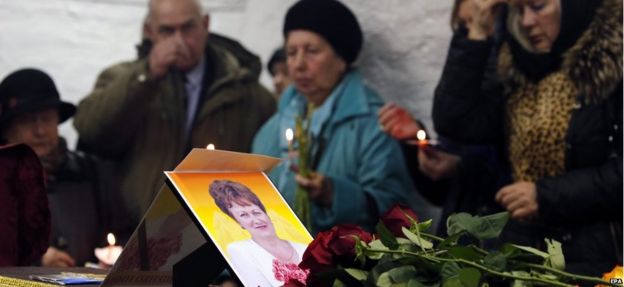
Russian personnel have been deployed to the site of the wreckage
Russia and Egypt have urged caution over suggestions that a Russian airliner that crashed in Sinai killing 224 passengers may have been bombed.
Russia said such theories were “speculation”, while Egypt said there was “no evidence” yet to support them.
US and UK officials say intelligence suggests the plane may have been bombed. The UK has suspended flights to and from Sharm el-Sheikh.
Militants linked to Islamic State have claimed they brought the plane down.
The Metrojet Airbus 321, bound for St Petersburg, crashed in Egypt’s Sinai desert just 23 minutes after take-off from Sharm el-Sheikh on Saturday.
Most of those on board the plane were Russian.
Live updates: UK-Sharm El-Sheikh flights grounded
Sinai Province: Egypt’s most dangerous group
“We cannot be certain that the Russian airliner was brought down by a terrorist bomb, but it looks increasingly likely that that was the case,” said UK Prime Minister David Cameron.
He and the Russian President Vladimir Putin have spoken by phone, according to a Kremlin statement.
Mr Putin stressed the importance of using data from “the ongoing official investigation,” to assess the causes of the incident, the statement said.
“Intercepted communications” have led the US to conclude tentatively that the Russian plane may have been downed by a bomb planted by the IS affiliate Sinai Province, an official told AP.
Kremlin spokesman Dmitry Peskov earlier said any explanations being put forward “seem like unverified information or some sort of speculation”.
Egypt’s Civil Aviation Minister Hossam Kamal said investigators had “as yet no evidence” to confirm a bomb attack.
Egypt is leading the investigation, with the help of Russian and other foreign experts. They will examine the wreckage for traces of explosives, but would not reach their first conclusions for a few months, said Alexander Neradko, head of Russia’s aviation agency.

Mr Cameron said he would discuss Egypt’s security concerns with President Sisi (right)
Egyptian President Abdel Fattah al-Sisi, who is on an official visit to the UK, is meeting Mr Cameron in London.
“We do not want to rush into conclusions,” he earlier told the BBC. “We all share the same concerns. We want to know the reasons behind it.
“The investigation will be disclosed with all transparency, we have nothing to hide.”
Mr Sisi had previously dismissed the IS claim as propaganda.
In other developments:
- German airline Lufthansa says its subsidiaries Edelweiss and Eurowings are halting flights to Sharm el-Sheikh as a “precautionary” measure and will work with the German foreign ministry and holiday operators to arrange return flights for customers in the resort
- Belgian airline Jetairfly postponed its Thursday flight from Brussels to the Egyptian resort for 24 hours while it analysed the security situation
- The Netherlands is advising its citizens against travel to and from Sharm el-Sheikh airport
- Along with the UK, Ireland had announced the suspension of all flights to the resort on Wednesday
Lyse Doucet, BBC News, Cairo
The timing of Britain’s statement on the air crash could not have been worse, just as President Sisi was arriving in London for his first official visit.
A senior official in his delegation told me this morning they were not told in advance. He said this would be one of the most important topics in today’s meeting between the two leaders and would have an impact on other issues. We won’t be as receptive, is how he put it.
Egyptian officials say they had responded to every British request for extra security at Sharm el-Sheik airport including additional troops in and around the airport.
This is a hugely embarrassing moment for the Egyptian authorities but, if it is proven that a bomb was on board the plane, they also face troubling questions about their ability to maintain security in the midst of significant threats.
Mr Cameron said it could be “some time” before thousands of UK tourists stranded in Sharm el-Sheikh were able to return.
“What we need to put in place is more security at that airport so it is safe to fly people home,” he said.
Metrojet, also known as Kogalymavia, earlier this week blamed “external influence” for the crash, but the head of Russia’s aviation agency said such talk was premature.
On Thursday, the airline suspended all flights of Airbus A321 jets in its fleet.
The Russian press has been playing down the idea that Islamist militants might be targeting Russia over its aerial bombing campaign in Syria.
A senior member of Russia’s upper house of parliament, Konstantin Kosachev, was quoted as saying that Britain’s move was “politically motivated by its opposition to Russia’s actions in Syria”.
Also on Thursday, the first funeral for a victim of the crash was held in Russia.
Nina Lushchenko, a 60-year-old school employee, was buried in Veliky Novgorod, south of St Petersburg.

At the scene: Sarah Rainsford, BBC News, St Petersburg
Anxious for information, Olga Ovechkina and other relatives now come to a hotel near the airport each day.
It has become the headquarters for an emergency response team. Raw-eyed relatives wander the lobby here or sit quietly and cry.
Dozens of psychologists are on hand to offer comfort, themselves clearly drained by the experience.
BBC
 Q FM Africa's Modern Radio
Q FM Africa's Modern Radio